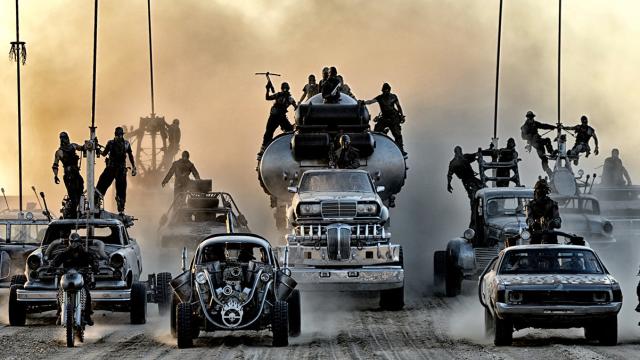Has it really been five years since the post-apocalyptic off-road opera of Mad Max: Fury Road? Indeed, the eyeball-searingly beautiful movie about an angry post-apocalyptic convoy is just about five years old now. Entertainment writer Kyle Buchanan collected an oral history of how it came together for The New York Times and I highly recommend reading it.
You’d be forgiven for thinking Fury Road was another basic-bitch action movie if you only saw trailers and screenshots. But the movie has a level of physical intensity and–if it’d not too cliché to say–realness that elevates it to an emotional experience.
Clearly I’m not the only one who thought so, as evidenced by the flick’s haul of Oscar nominations and the fact that we’re still talking about it in 2020.
Speaking of talking about it, Buchanan’s writeup revisiting the making of the movie is so interesting because it gets right at the realness the actors and filmmakers experienced putting the movie together. Modern movie animation is impressive, but there’s no substitute for physical stunts and moving a convoy of perversely modified wasteland vehicles to the actual wastelands of Namibia’s deserts.
Buchanan’s writeup here gets such great quotes from the people who made this movie, and of course, as cool as the vehicles were, it’s the people who made the movie great. Go check out his story on NYT. Meanwhile, here are a few quotes that exemplify just how intense the production was:
BEN SMITH-PETERSEN (stunt performer) On most films like this, you’re working your way up to a stunt — maybe there’s one a week. But on this film, from the time your day starts, you’re already doing a stunt and then there’s another one on top of that. It was a stuntman’s dream.
…
ZOË KRAVITZ (Toast, one of the five “wives” fleeing Immortan Joe) By the end, we wanted to go home so badly. It had been nine months, and not nine months where you’re in a city and you hang out in your trailer. It was nine months of the environment you’re seeing in the movie, with nothing around. You really do start to lose your mind a little bit.
…
ABBEY LEE (the Dag, another “wife”) The gruelling nature of the shoot really served it, in my opinion. The characters are supposed to be exhausted, they’re supposed to be searching for strength. I just don’t think that any of the performances would have been the same had it all been green-screen and we did it in a controlled environment. The fact that it was a huge mess is why it’s so brilliant.
Dang, I might need to re-watch that tonight.
